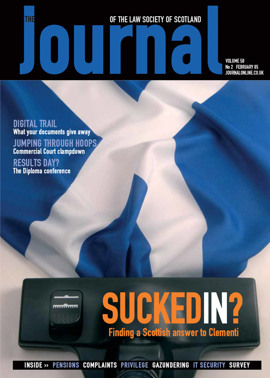The pull of the south

Sir David Clementi’s report was issued just before the end of the year. Now that the Society has had time to digest its contents, is it what was expected?
To a great extent, yes. It emphasises that its remit extends only to England and Wales, though the Law Society of Scotland is realistic in its expectations that some Clementi alterations south of the border could ultimately impact on the profession and public of Scotland.
The two main areas of recommendation are in relation to the regulation of the solicitor profession in England and Wales, and business models. It is Model B+ which is recommended, with the establishment of a Legal Services Board and Office for Legal Complaints. This will leave the Law Society of England and Wales in a position that they require to split their functions and to a certain extent decommission some of their existing operations. It is unclear what future role the Law Society of England and Wales will have in relation to regulation and there is clearly much for them to be negotiated with Government in Westminster. Whilst Sir David says that he has rejected a Model A solution, there are many who have read the report and see little difference between his recommendations and the Model A scenario. Perhaps the potential loss of rights of audience by English solicitors abroad influenced his initial thinking. This huge area of foreign earnings could have been prejudiced if English solicitors were seen to have been too closely regulated by Government. Independence of the profession is something which is taken very seriously in most other jurisdictions.
And what about business models?
It is also of little surprise to see that Sir David has recommended the establishment of Legal Disciplinary Partnerships. He is clearly intent on making his mark on delivery models. There is a clear divergence of opinion between the English Bar Council and the Law Society of England and Wales in this regard. It is fair to say that the Law Society of Scotland is likely to be slightly more relaxed about the principles lying behind this proposed change than the Faculty of Advocates. In any event we do not see a major initial impact on the Scottish market place.
Our concern in relation to LDPs is not simply that they are flagged by Sir David as an inevitable step towards multi-disciplinary practices, but the fact that they incorporate the concept of non-lawyer proprietorship. At least now there seems to be some recognition of the regulatory dangers which we have been raising from the start.
Is there anything significant which the report does not say?
Yes. I have to say that I am disappointed that Sir David has not tackled what I feel is the biggest difficulty both north and south of the border, and that is unregulated providers. When we first met with him a year or so ago we indicated that our main requirement was a level playing field for our members and it is frustrating that, yet again, the question of claims companies and related businesses has not been tackled by the Government or any of its agents.
It is also disappointing that no detailed consideration has been given to the regulation of non-lawyer proprietors. Our opposition to the Law Society of England and Wales’ proposed multi-disciplinary partnership model rested simply on the fact that we had never been satisfied that there was an adequate regulatory model lying behind it. Matters have become even more pronounced in relation to LDPs and we are disappointed that this issue – which from a public protection perspective is prime – has still not yet been addressed in detail.
The work we put into the Society’s response to the consultation showed our engagement in the regulatory process and our willingness to change and modernise our systems. The paper produces much less for us than we had hoped. We approached it in the same way as the Justice 1 Inquiry into the regulation of the legal profession in Scotland, with an open mind, stating that we were subject to Parliament’s will if they chose to remove the Society’s statutory regulatory powers in whole or in part or change them, but that if we were to retain regulatory powers then we would most certainly be looking to modernise our current regulatory systems. The Inquiry’s endorsement of the Society’s work subject to some change, and the co-operation of the Scottish Executive and Scottish Parliament, has helped us to achieve many changes.
I know that many who have read the Clementi Report remain sceptical about the assertion that the considerable changes to the regulatory landscape down south will be cost-neutral. We will simply have to wait and see, but experience in other areas indicates that where a process is “bureaucratised”, costs inevitably rise and this is a consideration for the profession.
What is the implementation time-line in England and Wales?
I know that the Law Society of England and Wales has done a great amount of work in looking at splitting its organization. LSEW is trying to anticipate as far as it can the pace at which the Clementi proposals will proceed. With the exception of the Bar Council, it is difficult to see much opposition to either aspect of Sir David’s proposals down south. The whole question of a General Election apart, it would appear that a white paper is likely to be issued later in 2005 with a bill in the autumn of 2006, royal assent the following year and probable implementation of the Legal Services Board and Office for Legal Complaints, and indeed splitting of the Law Society of England and Wales, in the spring of 2008. This can be described as “best guess” at this stage.
And what about timing in Scotland?
In Scotland the main focus now turns to the report which we expect this month from the Executive on the outcomes of the Justice 1 Inquiry from two or three years ago. These will have to be examined afresh by the Society in the light of a number of significant internal changes and a shifting external environment.
Since the Society responded to the original consultation paper in March 2003, there has been a tremendous amount of internal change. For example, an increase in the number of client relations committees, an increase in the resource devoted to that Department, 50% lay participation in the process and a complete change in our operational functions as a result of the implementation of the Council of the Law Society of Scotland Act 2003. All these have culminated in the outstanding recent achievement of dealing with 90% of our complaints within nine months. The Society in reviewing its policy will have to take cognisance of a range of external matters such as progress being made by the Scottish Executive Research Working Group, the OFT investigation into the allegedly anti-competitive Master Policy, the Proportionality Review which we will undertake in response to European Commissioner Monti’s challenge, and other related issues such as the policies and procedures being developed by the Scottish Legal Services Ombudsman.
It would be difficult to give any indication of a Scottish time-line but I can say that the Society will not develop policy without a full and frank debate in the profession. In the meantime we will focus on the ongoing consultation and research work in Scotland, for which we have been promised “Scottish solutions to Scottish issues”.
Does this mean more consultation and faculty visits?
Yes. We take pride in the fact that the awareness of the Clementi issues is high in Scotland. Council had a preliminary debate at the end of January and a more structured analysis will take place in February once we have the Justice 1 Report.
In addition to this the issues will get an airing at our Annual General Meeting on 18 March and will be high on the agenda for the faculty visits which we have arranged in Ayr, Greenock, Glasgow, Peterhead, Banff and Dunfermline, and also at the three big firms which we seek to visit between now and May.
The whole question of professional regulation and business models is not something which is just left to the Executive or the Office Bearers. It is a matter for Council and indeed the entire profession to become involved in. In Scotland, any outcomes must be characterised by intellectual rigour and honesty and extensive democratic debate.
It is fair to say that on one level of analysis the Scottish legal profession may have more difficulties in taking on board the Clementi philosophy. Founded in 1949, the Law Society of Scotland with its range of consumer protections is in some ways more akin to a form of “legal socialism”. The “free market” legal Thatcherism of Clementi will not graft easily.
What I can promise is that the Society will continue to consult with and report on progress to the profession.
For more comment on the Clementi proposals, see the President’s column – Editor
In this issue
- Sell or transfer? (1)
- Promoting competition or competitiveness?
- Promoting competitiveness or competition?
- Not the final word
- Challenge of the FSA
- The pull of the south
- A world of change
- Finding the path
- An elusive model?
- Bank on it
- Trouble at t'mill
- Hidden evidence
- Money claims on behalf of children
- Secure connections
- Tread carefully
- Sell or transfer?
- Cracking the conflict code
- X Factor for success?
- Scottish Solicitors' Discipline Tribunal
- Website reviews
- Book reviews
- Is "gazundering" always bad?
- Defining the guideline






